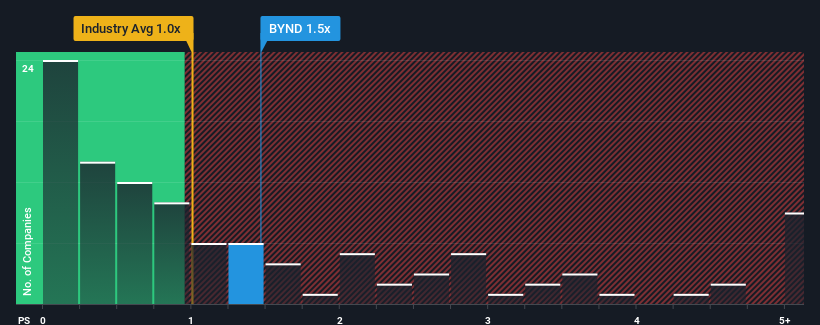
It's not a stretch to say that Beyond Meat, Inc.'s (NASDAQ:BYND) price-to-sales (or "P/S") ratio of 1.5x right now seems quite "middle-of-the-road" for companies in the Food industry in the United States, where the median P/S ratio is around 1x. While this might not raise any eyebrows, if the P/S ratio is not justified investors could be missing out on a potential opportunity or ignoring looming disappointment.
View our latest analysis for Beyond Meat

What Does Beyond Meat's P/S Mean For Shareholders?
Beyond Meat could be doing better as its revenue has been going backwards lately while most other companies have been seeing positive revenue growth. It might be that many expect the dour revenue performance to strengthen positively, which has kept the P/S from falling. However, if this isn't the case, investors might get caught out paying too much for the stock.
Keen to find out how analysts think Beyond Meat's future stacks up against the industry? In that case, our free report is a great place to start.How Is Beyond Meat's Revenue Growth Trending?
In order to justify its P/S ratio, Beyond Meat would need to produce growth that's similar to the industry.
Taking a look back first, the company's revenue growth last year wasn't something to get excited about as it posted a disappointing decline of 11%. As a result, revenue from three years ago have also fallen 30% overall. Therefore, it's fair to say the revenue growth recently has been undesirable for the company.
Turning to the outlook, the next three years should generate growth of 6.1% each year as estimated by the ten analysts watching the company. With the industry only predicted to deliver 3.0% each year, the company is positioned for a stronger revenue result.
With this in consideration, we find it intriguing that Beyond Meat's P/S is closely matching its industry peers. It may be that most investors aren't convinced the company can achieve future growth expectations.
The Key Takeaway
Typically, we'd caution against reading too much into price-to-sales ratios when settling on investment decisions, though it can reveal plenty about what other market participants think about the company.
We've established that Beyond Meat currently trades on a lower than expected P/S since its forecasted revenue growth is higher than the wider industry. There could be some risks that the market is pricing in, which is preventing the P/S ratio from matching the positive outlook. However, if you agree with the analysts' forecasts, you may be able to pick up the stock at an attractive price.
You should always think about risks. Case in point, we've spotted 3 warning signs for Beyond Meat you should be aware of, and 1 of them doesn't sit too well with us.
If strong companies turning a profit tickle your fancy, then you'll want to check out this free list of interesting companies that trade on a low P/E (but have proven they can grow earnings).
Valuation is complex, but we're here to simplify it.
Discover if Beyond Meat might be undervalued or overvalued with our detailed analysis, featuring fair value estimates, potential risks, dividends, insider trades, and its financial condition.
Access Free AnalysisHave feedback on this article? Concerned about the content? Get in touch with us directly. Alternatively, email editorial-team (at) simplywallst.com.
This article by Simply Wall St is general in nature. We provide commentary based on historical data and analyst forecasts only using an unbiased methodology and our articles are not intended to be financial advice. It does not constitute a recommendation to buy or sell any stock, and does not take account of your objectives, or your financial situation. We aim to bring you long-term focused analysis driven by fundamental data. Note that our analysis may not factor in the latest price-sensitive company announcements or qualitative material. Simply Wall St has no position in any stocks mentioned.
About NasdaqGS:BYND
Beyond Meat
A plant-based meat company, engages in the development, manufacture, marketing, and sale of plant-based meat products under the Beyond brand name in the United States and internationally.
Low and slightly overvalued.
Similar Companies
Market Insights
Community Narratives



